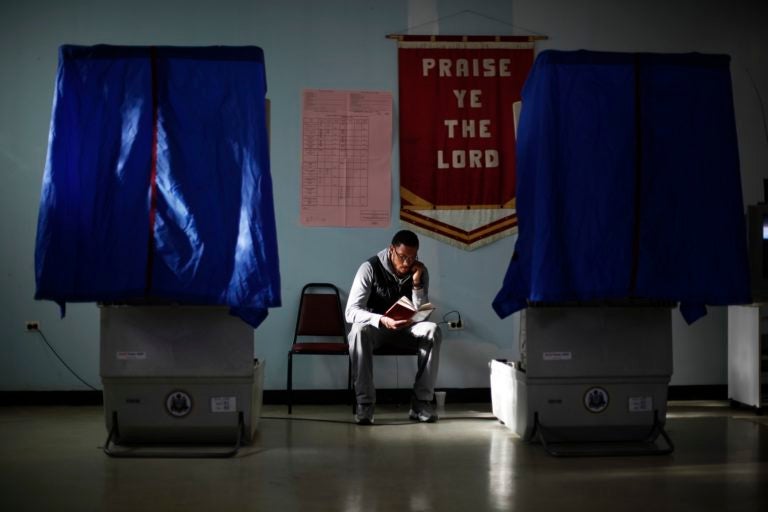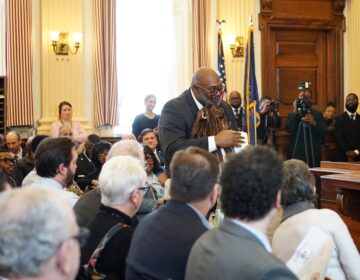The partisan conflict behind a quest to purge up to 800,000 voters from Pa.’s rolls
Judicial Watch is suing Pa. and three suburban counties to more aggressively purge “inactive” voters. Opponents say that could lead to disenfranchisement.
Listen 2:03
Election worker Khalid Battle reads a book as he waits for voters to cast their ballots in Pennsylvania primary election at Memorial Gospel Crusades Church in Philadelphia. (AP Photo/Matt Rourke)
It’s a worst-case scenario for a voter: You show up to your polling place on Election Day, give your name, but are told you’re not on the rolls. You know you registered. You know you’re in the right precinct. What do you do now?
“In our election protection efforts, and especially in 2018, we worked with a number of people who went to their polling locations and were told that there’s no registration,” said Vic Walczak, an attorney with the Pennsylvania branch of the American Civil Liberties Union.
“They were regular voters,” he added. “They had not moved, they had voted in the most recent election and notwithstanding that, for some reason their names were not in the voter registration rolls.”
Voting rights advocates like Walczak are worried that if states clear voters deemed “inactive” from their rolls too zealously, that exact scenario might happen more often to people who should not have been removed.
But more aggressive voter roll maintenance is exactly what the conservative group behind a lawsuit targeting counties across the U.S. — including three of Pennsylvania’s largest — wants to see.
Judicial Watch alleges that up to 800,000 voters registered in the commonwealth should be classified as “inactive,” and that Pennsylvania and several of its counties are inadequately carrying out federal and state voter laws.
Why sue Pennsylvania?
Judicial Watch, which formed in 1994, issued a series of warnings early this year to counties it deemed likely to have too many registered voters.
The group said it had identified hundreds of thousands of inactive voters in Pennsylvania, and sued to have them purged in Bucks, Delaware and Chester Counties — three populous counties in the Philadelphia suburbs that voted for Hillary Clinton in 2016 and will play key roles in deciding the 2020 election.
The group is also suing Pennsylvania Department of State Secretary Kathy Boockvar.
In an interview, Judicial Watch President Tom Fitton declined to share the group’s exact methodology, saying only that it had compared registration data against counties’ overall populations. The group’s lawsuit links to 2018 reports from the U.S. Election Assistance Commission.
However, earlier this year, after the group first sent out warnings about impending lawsuits, the Bucks County Courier Times conducted a review of county registration statistics and found that nationwide, the 19 counties Judicial Watch opted to sue did not consistently have the highest voter registration rates, but had invariably voted for Hillary Clinton in 2016.
Fitton doesn’t downplay the partisan nature of his work.
“You have to wonder why it is they’re so desperate to make sure their election systems are unsecured,” he said of the state and county officials Judicial Watch sued, many of them Democrats. “I think it’s fair to wonder whether they want to be able to steal elections.”
As it stands, it’s unlikely Judicial Watch’s ongoing lawsuit will have much of an impact on the November election.
Christopher Conner, the Middle District judge overseeing the case, has delayed discovery, citing the impending election and “the current COVID-19 pandemic.” Suzanne Almeida, interim executive director of Common Cause Pennsylvania, one of the good government groups that has filed to intervene in the lawsuit, said she isn’t expecting a settlement before then.
Partisan fighting over voter roll maintenance, however, goes far beyond the 2020 election.
Why do voters get taken off the rolls?
A certain amount of voter roll maintenance is required under federal and Pennsylvania law. Voters, after all, routinely die or move to other states, and need to be removed so the rolls stay up-to-date.
That maintenance is not inherently controversial.
“Common Cause is certainly concerned with making sure that our voting rolls are updated and accurate,” Almeida said. “We have no interest in bloated voting rolls … Incorrect information on the voter rolls isn’t good for anyone.”
Judicial Watch’s Pennsylvania lawsuit, however, is based on an independent analysis it says it conducted of counties’ voter roll maintenance from 2016 to 2018 — specifically as it relates to voters who could be axed from the rolls due to inactivity, not death or relocation.
The group reports finding that Bucks, Chester and Delaware Counties had, respectively, purged eight, five and four voters from their rolls for failure to vote in two federal elections and to respond to address confirmations from the county boards of elections.
It called those numbers “absurdly small,” though the group did not cite any examples of improper voting.
Bucks, Chester and Delaware Counties, and the Pennsylvania DOS all submitted rebuttals in court, arguing that their voter roll maintenance is well within the law. The counties argued the case should be dismissed.
A spokesperson for Bucks County also provided a letter it had sent to Judicial Watch, arguing that the group’s assessment of its voter roll maintenance was inaccurate.
Judicial Watch’s argument that the counties’ voter roll maintenance is illegal hinges on a provision of the federal National Voter Registration Act, which requires states to make “a reasonable effort to remove ineligible persons from the voter rolls.”
It’s also based on a Pennsylvania voting law that stipulates that county election offices “shall institute a program to protect the integrity of the electoral process and to ensure the maintenance of accurate and current registration records.”
Fitton says in his mind, the intention of those laws is unambiguous: “The law requires that states take proactive measures to register people to vote,” he said. “The mirror of that in the law, is that they take reasonable steps to clean up the rolls.”
His specific concern is a non-registered person receiving a mail-in ballot intended for a dead, absent or otherwise non-voting person, and committing fraud.
“Someone gets a ballot application or … a ballot explicitly sent to places, to locations where people aren’t there anymore, and someone else can vote in their name,” he said.
Pennsylvania requires voters to specifically apply for mail-in ballots in order to receive them. They can submit those applications online or — if they don’t have a driver’s license or PennDOT ID number or prefer to apply by mail — they can request an application from their county elections office, mail it back, and receive a ballot if they’re cleared to vote.
There can be exceptions. In this year’s primary, Allegheny County automatically sent ballot applications to all of the registered voters on its rolls due to concerns about the coronavirus pandemic curtailing voting. But the state doesn’t do that as a matter of course, and no county has automatically sent ballots.
Walczak, the ACLU attorney — who often represents intervenors in voting rights suits — noted that the same federal law requiring counties to make “reasonable efforts” to clean up voter rolls is broadly intended to make voting more accessible.
Plus, he said, he thinks Judicial Watch’s allegations are “vague” and don’t include actual evidence of wrongdoing.
Voting improperly, he argued, is difficult. In Fitton’s scenario, in which a non-registered person mistakenly receives an absentee ballot application, the would-be fraudster would have to forge a signature, and would face stiff penalties if caught — five years in prison under state law, and five under federal.
“So if you were, for instance, to vote on behalf of a dead person and get caught, you’re looking at 10 years in jail for the purpose of swinging one vote,” he said. “Man, that’s a pretty hefty penalty, because one vote is not going to swing an election.”
The upshot
Asked what a voter cleared from the rolls in an overzealous purge should do when they turn up to the polls, Fitton said he didn’t think the error would be a big deal.
“Oh, I’m sure they can vote provisionally,” he said.
Walczak and Almeida both encouraged voters to do so if their names are not found on the rolls. But both noted that if a voter’s name is truly gone from voter registration records, that vote won’t be counted.
A 2018 report from the left-leaning Brennan Center for Justice noted that there have been several examples of mistake-ridden voter purges in recent years — about 120,000 voters improperly removed in 2016 in New York City; a botched list of proposed removals in Arkansas that same year; a 2013 purge of almost 39,000 Virginia voters that critics believed was riddled with errors.
The report’s authors conclude that numbers of aggressive purges have been rising over the last several years — in part, because of an increase in lawsuits by private parties who believe “jurisdictions are not purging enough names from the rolls.”
Outcomes vary in the legal battles that ensue from those suits.
A high-profile case in Georgia stemming from a 2017 purge of about 100,000 voters ended with a federal judge ruling that those voters did not have to be reinstated.
Last year, Georgia went on to purge more than 300,000 more names.
The best defense against voter roll mistakes, Walczak said, is voters staying up-to-date on their registration status.
“It is so important for every voter, every wannabe voter, to go on the Department of State website — it literally takes two minutes — and check and make sure that your registration is there,” he said.
Pennsylvania voters have until Oct. 19 to register.
___
Editor’s Note: This story has been updated to clarify Pennsylvania’s mail balloting process.

Get daily updates from WHYY News!
WHYY is your source for fact-based, in-depth journalism and information. As a nonprofit organization, we rely on financial support from readers like you. Please give today.







